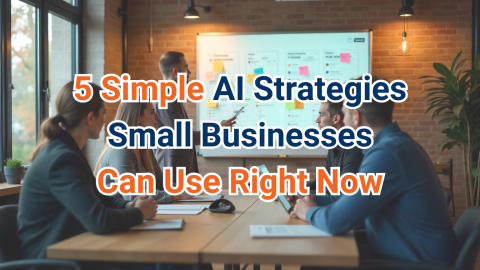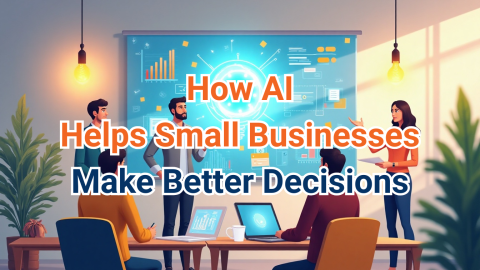In today’s competitive retail landscape, small businesses face immense pressure from large corporations and eCommerce platforms. These big players have deep pockets, large teams, and advanced tech—especially AI—working to optimize everything from inventory to customer engagement. But here’s the exciting news: AI for retail business is no longer exclusive to large enterprises. It’s affordable, accessible, and now perfectly suited to the needs of local shops, boutiques, and independent sellers.
Whether you own a fashion store, a bookstore, or a specialty grocery shop, AI can help you increase efficiency, improve customer experiences, and grow your revenue without needing to hire a tech team.
Personalizing the Customer Journey
One of the most powerful uses of AI in retail is delivering personalized shopping experiences. Large brands use AI to tailor product recommendations and promotions to each shopper. You can now do the same using tools like Clerk.io and Octane AI.
These tools collect data from your website or POS system to identify customer preferences and buying habits. If someone frequently purchases eco-friendly skincare, your AI tool can automatically suggest related products, offer bundles, or send a personalized thank-you message with a discount code.
Personalization leads to higher conversion rates, repeat business, and increased customer loyalty—all without lifting a finger once the system is set up.
Smarter Inventory Planning
Keeping track of what’s selling and what’s sitting on shelves is time-consuming and risky when done manually. AI inventory management tools like Inventory Planner and Katana help you predict future demand based on seasonality, sales history, and current stock levels.
These tools can recommend what to reorder and when, automate low-stock alerts, and even prevent overstocking—saving you money and storage space. For small businesses, efficient inventory control can be the difference between profit and loss.
Real-Time Sales Predictions and Insights
Wouldn’t it be great to see trends before they happen? AI-powered analytics platforms like Futrli and Pencil give you just that. They analyze sales data in real time and help forecast what products are likely to sell best in the near future.
By spotting early signs of high-performing items, you can adjust your marketing strategy, plan promotions, and allocate stock accordingly. These platforms also flag underperforming products so you can take action before losses accumulate.
Boosting Customer Service with AI Chatbots
You might not have a team to handle customer queries 24/7—but with AI, you don’t need one. Chatbot solutions like Tidio and Gorgias allow you to offer round-the-clock assistance without extra staff.
These bots can answer frequently asked questions, check product availability, process returns, and even suggest products—freeing up your time while keeping customers happy.
Enhancing In-Store Operations with Smart Tools
AI doesn’t stop at online retail. Physical stores benefit too. Solutions like Sensei offer in-store analytics through cameras and sensors. They track foot traffic patterns, dwell times, and product engagement to help you optimize shelf placement, signage, and promotions.
Smart POS systems like Square and Lightspeed use AI to suggest upsells, automate discounts, and offer loyalty rewards—all during checkout. These tools enhance the customer experience and improve average transaction value.
Automating Marketing Campaigns
Small business owners often struggle to keep up with marketing emails, SMS campaigns, and promotions. AI-driven platforms like Mailchimp and Omnisend automate the process.
They can personalize messages for each customer, optimize send times, and even suggest subject lines. AI tracks user engagement to improve performance over time—meaning more revenue from the same marketing budget.
Final Thoughts
You don’t need a massive team or huge investment to compete with big brands anymore. With AI for retail business, small retailers now have access to smart, scalable, and affordable tools to run their operations more efficiently.
From predictive analytics and inventory forecasting to customer personalization and automated marketing, these technologies are available, easy to use, and designed with small businesses in mind.
The key is getting started—pick one area of your business where you feel overwhelmed, and explore how AI can help. Once you experience the results, you’ll likely want to integrate more.





